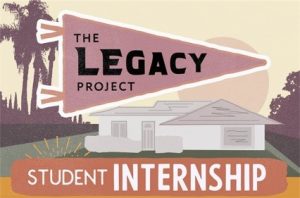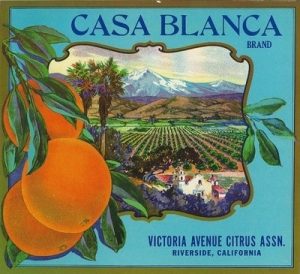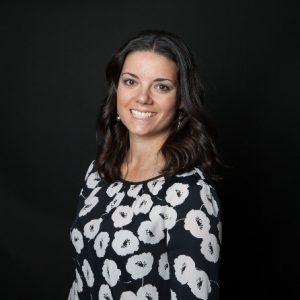Called to Community: The Legacy Project
God’s word, and work in us, reveals that we are created as relational and communal beings; we are created to be in relationships. We experience relationships within our family of origin, our friend and peer groups, in school and work settings, and in the communities in which we live and serve. These relationships, while important in themselves, are also critical ways in which we learn how to be in relationship with God; created in His image and likeness (Genesis 1:27).
 This past spring, Professor Costello and I (both faculty in the College of Behavioral and Social Sciences here at CBU) had the opportunity to pursue a project which would work toward building relationships between CBU students and residents in the neighboring Riverside community of Casa Blanca. Through funding provided by the Council of Independent Colleges, The Legacy Project was born. The Legacy Project will allow for 20 undergraduate students, majoring in psychology, anthropology, sociology, behavioral science, and film, to conduct field work, by participating in a yearlong internship gathering the oral histories of senior residents living in Casa Blanca. The oral histories will focus on the cultural history, resiliency, faith, and spirituality of the residents; and the residents’ histories will not only be preserved, but also shared. In this process, opportunities to develop rich and flourishing relationships across generations and cultures will be numerous.
This past spring, Professor Costello and I (both faculty in the College of Behavioral and Social Sciences here at CBU) had the opportunity to pursue a project which would work toward building relationships between CBU students and residents in the neighboring Riverside community of Casa Blanca. Through funding provided by the Council of Independent Colleges, The Legacy Project was born. The Legacy Project will allow for 20 undergraduate students, majoring in psychology, anthropology, sociology, behavioral science, and film, to conduct field work, by participating in a yearlong internship gathering the oral histories of senior residents living in Casa Blanca. The oral histories will focus on the cultural history, resiliency, faith, and spirituality of the residents; and the residents’ histories will not only be preserved, but also shared. In this process, opportunities to develop rich and flourishing relationships across generations and cultures will be numerous.
Students who participate in The Legacy Project will gather the senior residents’ oral histories through a research process called qualitative interviewing. These interviews will be recorded on video, and crafted into short films featuring each senior participant. The films will then be shown at an event, hosted at CBU, this spring (2019), and attended by both students and community members.
My own experience conducting fieldwork began as an undergraduate student, participating in an ethnographic study in communities called favelas in Rio de Janiero, Brazil. These early experiences, interviewing community members, social workers, activists, and political leaders, were critical experiences, not just for the project that I was participating in, but also for developing my interests that lead to my future pursuit of a career in higher education.
 Perhaps you have an interest in how your academic pursuits and community interests might align. If so, I’d encourage you to find out more about The Legacy Project or other research labs and opportunities through the Center for the Study of Human Behavior.
Perhaps you have an interest in how your academic pursuits and community interests might align. If so, I’d encourage you to find out more about The Legacy Project or other research labs and opportunities through the Center for the Study of Human Behavior.
Whether participating in The Legacy Project or another research or field work opportunity, I hope that you have a chance to build relationships with those that you might not have otherwise come into contact with. The concept of imago dei reminds us that in His image, we can find shared human experiences and ways of being in groups and in places where we might have least expected it. Or in the words of astronaut Donald Williams “For those who have seen the earth from space, and for the hundreds and perhaps thousands more who will, the experience most certainly changes your perspective. The things that we share in our word are far more valuable than those which divide us.” (Kelley, 1988). In this era of multifaceted globalization, we are experiencing incredible interconnectedness, never experienced in this way during any other time in history. Yet, the incredible paradox here may be the great lack of connection that we experience in the midst of being connected to everyone, and everything, everywhere. Scholar Daniel Groody (2007) describes this as an era of integration and dis-integration.
In an era characterized be global connectedness, yet great dis-integration, we must seek ways to intentionally connect to our neighbors; resisting being connected to everything, yet feeling totally disconnected, even isolated or alone. Consider how you will, in your personal, professional, and academic pursuits, lean in to your relational self and build bridges today.
—
Groody, D. G. (2008). Globalization, spirituality, and justice: Navigating a path to peace. Maryknoll, New York: Orbis Books.
Kelley, K. W., & Association of Space Explorers. (1988). The home planet. Reading, Mass: Addison-Wesley.
—
 Dr. Jacqueline N. Gustafson
Dr. Jacqueline N. Gustafson
Dean
College of Behavioral and Social Sciences
17 Comments
How wonderful that our students have such an amazing opportunity to get involved in our community in a way similar to how you got your start, Dr. Gustafson! A chance to make a lasting impact while also boosting their resumes!
This opportunity to develop relationships and learn from those so close in proximity to us, yet who have such a rich and beautiful history is truly amazing. Dr. Gustafson, I enjoyed your initial remark regarding how we are created to be relational and communal beings, and I hope to further learn how to maintain a relationship with God as I participate in this great experience.
So exciting that you are involved! At the CSHB, we are pretty excited about this project and hope to hear more about it as it continues to unfold.
This seems like a really great opportunity that has been made available, not only to the students who will be interning, but also for the community that they will reach. It is such a great idea to collect, preserve and share these histories that we otherwise may not hear!
Hearing the life stories of these seniors is something I’m particularly looking forward to as well!
I work in a skilled nursing facility currently and I can’t tell you how important it is for our elders to connect with their community. I love that The Legacy Project provides a platform for them to tell their stories. Many of them have lived though very prominent events in history. Sure, we can read about these events in history books, but why not go straight to the source. Telling their stories also reminds them that they are significant, and shows them that the community wants to embrace their legacy.
I am glad that I am a part of the legacy project. I am looking forward to have a more comprehensive understand of the qualitative research is. Hope I will be a good researcher in future.
It is truly amazing how the idea of gathering the oral histories of the senior residents from the Casa Blanca community has finally came to life. I am honored to be working closely with Dr. Gustafson on this beautiful project. Looking forward to showing CBU what we have learned from our seniors in Casa Blanca!
This opportunity sounds amazing! Not only will it make students become social with our city but give the opportunity to senior residents to make new friends. Going out making new experiences with people you do not intend to is a great memory one will cherish.
Spending time with seniors in Casa Blanca over the past month has really shown me the validity of the concept that we are created as relational beings. The individuals living in Casa Blanca realize the value of community and relationships and they have taught me so much already. I am blessed to be a part of this amazing project and I am excited to see how God uses everyone involved for His purpose.
All too often, I hear the word “community” thrown around by others on campus. Although it is always expressed with positive connotations, most of the time I sense limited notions and impressions as to what this word truly means. I am certainly guilty of having a limited perspective on the word “community”, my understanding confined by my relatively sheltered experiences. Often times, only images of people and activities within my own social network or church group would come to mind. What does community mean? What does that look like and entail in the real world, outside of the contextual bubbles of my home, church, and college life? Where does our inherent desire for community come from and how does that shape individual attitudes and behaviors within interpersonal interactions and social contexts given our unique personalities and inclinations? How does this all tie in together and reflect the nature of our own relational, communal, and triune God and how he has made us in his image (as referenced in the post, the concept imago dei)?
As one of the students within the Legacy Project, it has been exciting to ask myself these questions and reflect on concepts like this. Though only a quarter of our time on this project has passed, I feel that this project has already been life changing as I have been learning and growing so much. When I think of community now, I picture the senior residents gathered in the small community center room, with their welcoming smiles and waves, unfiltered banter with each other, and seasoned wisdom as they share their life with one another and now, me.
I am so thankful for the opportunity I have to be a part of this project and I look forward to whatever the coming days may bring.
I am apart of the Legacy Project and being involved with is just as amazing as Dr. Gustafson described it. The world we live in is really about building relationships and forming communal bridges that reveals how alike we are in our human nature. The experience so far has been profound and eye opening in collaborating with peers and connect with people in the neighboring Casa Blanca. I can’t wait to see how the service of the project will honor Casa Blanca and its residence. I believe this project will initiate a mindset and culture in which people will take it upon themselves to connect and build relational bridges between the people inside and outside their community.
I believe I said something along these lines at an earlier point, but I love the efforts being made to give back to a community who is being gracious enough to share their time and their history. It can be so hard to give your story when it threatens to expose your deepest hurt and the vulnerabilities you shelter from other people who won’t understand. In life, we owe it to ourselves and one another to be considerate, to be loving, and understand each other’s experiences as best we can. I love the concept of “Imago Dei!” And I’m happy to be a part of the project, Dr. Gustafson.
The Legacy Project is truly an amazing opportunity to provide the senior residents of Casa Blanca a platform to have their oral histories heard. Their stories should be told and we should build relationships and connect with their cultural history. Not only do we have the opportunity to gather rich stories, but we also have the opportunity to learn and have a better understanding of our community. I am honored to be a part of The Legacy Project and working alongside Dr. Gustafson and Professor Costello on this project. I look forward in building relationships and having the privilege to share the stories of our senior residents living in Casa Blanca.
It has been immensely edifying seeing how CSHB is becoming involved in a community so close to CBU. This a great way to show that we truly care for people as they have been made in the image of God as mentioned above. I hope being able to build relationships with this community will further advance the gospel. I am excited to see how our Triune God will work over the course of these two semesters.
Very excited to be immersed in the Casa Blanca community! I think this can be great learning experience for the students.
I was in attendance to The Legacy Project banquet, and I was so pleasantly surprised by what I learned about Casa Blanca! Growing up in Riverside, of course most of us who didn’t grow up in that area had many perceptions and preconceived ideas about that neighborhood. This could have been through stories or the “reputation” of Casa Blanca that we’ve heard. However, this project goes to show that taking the time to actually learn about people and a place can dramatically change our perception and idea of them, in this case, for the better.